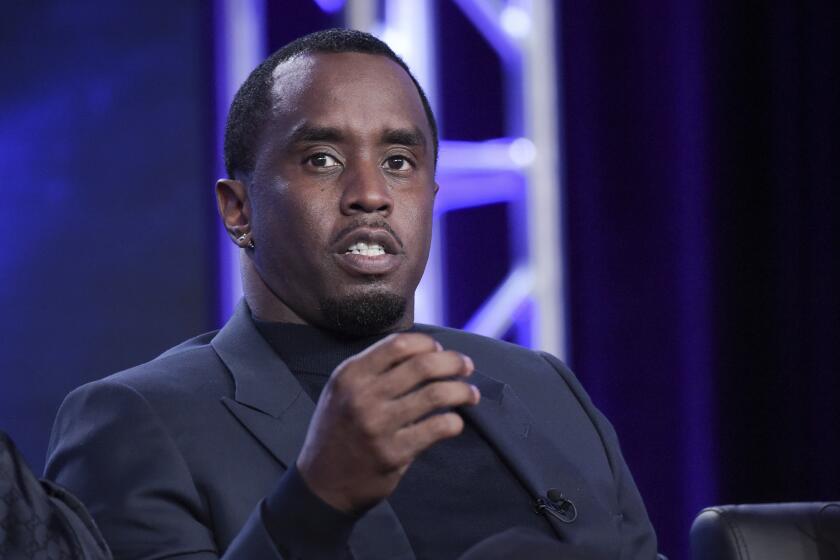2014 was a remarkable year for grown-up soul music
The first great album I heard in 2014 was “Love, Marriage & Divorce” by Toni Braxton and Babyface. The last was D’Angelo’s “Black Messiah.”
Plenty separated these excellent records. The former, a reunion of the R&B singer and the producer who oversaw much of her early work in the 1990s, had an extensive promotional rollout, while the latter — a long-delayed follow-up to 2000’s influential “Voodoo” — appeared with little warning on iTunes one night last month.
Both topped Billboard’s R&B chart, but what connected them was stronger: the handling of adult concerns like parenthood and politics in songs that felt just as vivid as flashier, more youthful tunes about finding love in the club. R&B is often referred to as baby-making music, but it can also be music for people who’ve already made their babies.
Though Braxton told me last January that the genre routinely neglected a mature audience — “There’s nothing for the 35-and-older crowd,” she said — we are emerging from a remarkable year for grown-up soul music, with impressive work by, among others, Kem and Prince, who sang in his song “Breakdown” about overcoming the distractions that surrounded him as a younger man.
Beyoncé, as she so often does, got a jump on the competition with her so-called visual album pairing 14 songs with 17 music videos. Released at the end of 2013, “Beyoncé” takes up a wealth of topics, including the illusory nature of celebrity and the ways in which society works to tamp down girls’ ambition.
But in the year since it came out (and the six weeks since it reappeared in a deluxe edition), I’ve found myself most drawn to what the record tells us about marriage, specifically to its insistence — in songs such as “Rocket” and “Drunk in Love,” a delightfully raunchy duet with her husband, Jay Z — that married sex needn’t lose touch with the friskiness that suffuses a hook-up jam like “Touchin, Lovin” by Trey Songz and Nicki Minaj.
There’s no moral superiority in Beyoncé’s position; it doesn’t correct a problem in Songz’s attitude or that of any other R&B Lothario. Yet her perspective is encountered so rarely in pop that it provides a real (and welcome) jolt when she admits in one song that she can’t wait to be with her man — not out on the town but at home, so he can … well, it’s not printable in this space.
Her invocation of the family nest runs deeper in “Blue,” a gently devastating ballad about the singer’s relationship with her daughter. As much as I love “2 On,” Tinashe’s gorgeously slinky club hit about “getting faded till we trip,” the range of feeling and experience on Beyoncé’s album had more to say to me, a 36-year-old parent, every time I came back to it.
The same goes for “Love, Marriage & Divorce,” nominated for a Grammy Award for R&B album. Braxton and Babyface have never been married to each other in real life, but individually each has gone through the phases in the album’s title, and here they look back on it all in songs that luxuriate in romantic promise (“Reunited”), even as they ponder the inevitability of disappointment (“Hurt You”).
They confront the inevitability of growing older too — an act of heroism, practically, in a music scene that prizes youth no less today than it did when Braxton, now 47, was on her way up.
Among the misfortunes she hopes befall an ex in the amazingly frank “I Wish”? That his new lover cheats on him “with somebody who’s 22.” To hear Braxton sing the words in her husky alto, a voice that’s gotten only more sensual over the years, is to hear her happily embrace the wisdom and maybe the sly sense of humor that accompanies age.
Wisdom oozes too from “Black Messiah,” the album that D’Angelo fans feared would never come after the impulsive singer more or less disappeared a decade ago.
As he did on “Voodoo” and his hit 1995 debut, “Brown Sugar,” D’Angelo rhapsodizes about sex, sometimes tenderly (as in the fluttering “Really Love”), sometimes filthily (as in “Sugah Daddy,” which contains an explicit boast I can’t recall previously hearing in an R&B song).
Whatever his tone, though, the singer and his expert backing band — billed as the Vanguard, with players including bassist Pino Palladino and Roots’ drummer Questlove — move through these heavy-groove soul-funk tunes so deliberately and with so much musicianly detail that you understand why it took them so long to make it.
“Can’t snatch the meat out of the lioness’ mouth,” D’Angelo sings, as though explaining his creative process. “Sometimes you gotta just ease it out.”
It’s clearer still that you’re in the hands of an adult, of someone with an expansive sense of time and (in)justice, when he turns his attention beyond the bedroom. D’Angelo was reportedly inspired to push up the release of “Black Messiah” as a result of last year’s widespread protests over police killings of unarmed black men.
But what’s most profound about the album’s politically minded songs — such as the naturalist’s warning “Till It’s Done (Tutu)” and “The Charade,” where he rhymes “a chance to talk” with “outlined in chalk” — is how much he leaves the listener to sort out. Even “1000 Deaths,” with its scrubbing guitar and sampled dialogue from a documentary about a member of the Black Panther Party, resists being reduced to an easily digestible slogan.
A grown-up artist with grown-up passions and worries, D’Angelo trusts you to meet him halfway. He’s not interested in making babies smile.
Twitter: @mikaelwood
More to Read
The biggest entertainment stories
Get our big stories about Hollywood, film, television, music, arts, culture and more right in your inbox as soon as they publish.
You may occasionally receive promotional content from the Los Angeles Times.










